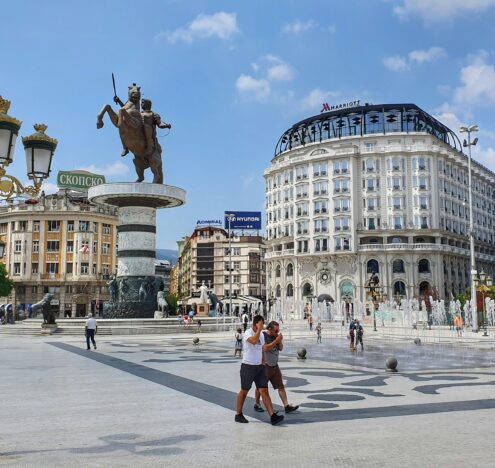This analysis was featured in Critical State, a weekly newsletter from Inkstick Media and The World. Subscribe here.
The arrival of the COVID-19 pandemic produced a flurry of social science research, some of which we covered in earlier Deep Dives. Earlier on, it seemed like the pandemic might be a discrete event, something that would end shortly after infection rates spiked or a vaccine was produced. Yet here we are, in a world of virus variants, worldwide imbalances in vaccine distribution, and plateauing vaccination rates where the vaccine is available. As the pandemic has dragged on, so has the accompanying social science. We’ll look at some of it this week and next on Deep Dive.
The wide divergence in COVID-19 response between various governments has prompted vigorous debate about the extent to which individual leaders make a difference in a government’s ability to contend with a pandemic. On one hand, the disastrous records of the US and Brazil under noted advocates of COVID-19 junk science Donald Trump and Jair Bolsonaro seem to suggest that leaders’ personal attitudes toward the virus make a major difference. On the other, well-intentioned leadership in the Global South can’t overcome a situation in which countries in the Global North largely monopolized the most effective vaccines, delaying potentially life-saving care to millions.
In Brazil, having a woman mayor makes a sizable, positive difference in COVID-19 outcomes. The idea that women leaders have been better on pandemic response than men, however, is not new.
A new paper by Raphael Bruce, Alexsandros Cavgias, Luis Meloni, and Mário Remígio tries to account for the role of individual leaders by isolating one particular characteristic of government executives: their gender. Their work tests the question of whether women mayors in Brazil outperform their male counterparts in pandemic response.
The idea that women leaders have been better on pandemic response than men is not new. Tsai Ing-Wen, the president of Taiwan, and Jacinda Ardern, the prime minister of New Zealand, have been among the most successful leaders in the world at managing the COVID-19 crisis, and garnered a great deal of attention for doing so. Bruce et. al.’s contribution is to design a study that controls for other aspects of governance to show just the effect of gender on COVID-19 outcomes.
To accomplish that, the researchers relied on the outcomes of Brazilian mayoral races. In Brazil, mayors have significant public health powers, which were reinforced by an April 2020 ruling from the country’s supreme court holding that the federal government could not intervene to repeal local measures designed to control the pandemic. Mayors, therefore, are important players in Brazil’s COVID-19 response. To differentiate the effects of gender, the researchers looked only at mayors who had won election in close races against someone of a different gender. In these thin-margin municipalities, the public did not have a clear preference for the gender or political affiliation of their mayor. As a result, COVID-19 policies in those municipalities more likely reflect mayoral decisions rather than pre-existing popular preferences.
Based on public health data from those municipalities, the researchers estimate that having a woman mayor makes a sizable, positive difference in COVID-19 outcomes. They predict that a municipality going from a man to a woman in the mayor’s office would see an average of 25.5 fewer COVID-19 deaths per 100,000 residents, and about 47 fewer COVID-19 hospitalizations per 100,000 residents. These effects appear to be the result of measurable gender differences in implementing social distancing and mask requirements. Women mayors were significantly more likely than their male counterparts to require face coverings, prohibit large public gatherings, and enforce lockdowns.
Notably, the observed gender effects were greater in municipalities that supported President Bolsonaro. In cities and towns where Bolsonaro won a vote share above his national median, having a woman mayor reduced COVID-19 deaths by roughly 42.5 per 100,000 residents and reduced hospitalizations by 80.5 per 100,000, much higher than the overall effect.
The researchers attribute the difference to a preference among women leaders for life-saving measures over vote-getting, but it is easy to imagine other explanations. Bolsonaro labeled those attempting to control the virus “sissies” and has urged Brazilians to embrace an ostentatious masculinity in the face of the pandemic. It may be easier for women to exempt themselves from that rhetoric when balancing policy preferences against considerations of their political future. Women, they may reason, are less likely than their male counterparts to be dinged by surviving voters for failing to join what amounts to a masculine death cult. In the end — if there is an end — that freedom of political action could end up saving a lot of lives.




















